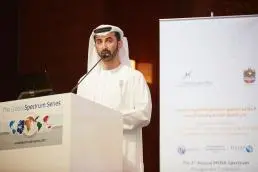PHOTO
The TRA, in corporation with the ITU, has hosted the 3rd Annual Middle East and North Africa Spectrum Management Conference held during the period 24-25 January 2017 in Dubai, in the presence of ministries and authorities concerned with spectrum affairs in the Arab region, and several private sector companies.
The conference witnessed a significant presence of many decision-makers in this area, including HE François Rancy, Director, ITU Radiocommunication Bureau, Abdul Karim Somalia, Secretary-General of the African Union Communications, Engineer Mahmoud Mubarak Al Saiyar, Director General of the GCC Telecommunications Bureau.
At the beginning of the agenda, H.E. Majed Sultan Al Mesmar, Deputy Director General for Telecommunications Sector - TRA said: "The value of this type of gatherings stems from the exceptional importance of the ICT sector, which has become the central system of development and progress in various fields; in accordance with a number of prospective studies that monitor the future of humanity in the coming years and decades. If the telecommunication sector is this important, the spectrum system lies at the heart of this importance in terms of being a vital natural resources of the countries, as well as in terms of overlapping with many of the economic, social and security considerations."
"With the growing demand for frequencies to meet the accelerating requirement for data and applications associated with it, we have allocated bands for the fourth generation of mobile service and provided the 700, 800, 900, 1800, 2100 and 2600 bands, as well as the possibility of switching to the 3500 band for fifth generation uses. The TRA has also developed the Digital TV Switchover Plan in the frequency band 470-694 MHz, and developed specifications and standards for receivers of this service, in addition to the T-DAB switchover plan to be implemented during 2018. Moreover, the TRA has devised the 5G mobile service road map and developed IoT applications in line with the national agenda and the UAE vision in this area, in cooperation with all concerned parties in the UAE.“ H.E. added.
H.E. stressed: "The global and regional cooperation in ICT field has become common and necessary at the same time. We believe that this conference is one of the essential frameworks to achieve a deeper understanding of the requirements of work in preparation for the next stage. I am confident that what you will come up with something different than what you came with, so that when the opinions converge under the same roof, they will inevitably arrive to what is best."
The conference agenda, which lasted for two days included many discussion sessions, presentations and open dialogue sessions, which highlighted the importance of spectrum in achieving sustainable development in the world and strengthening the efforts of cooperation and coordination among the Arab countries in this field on one hand, and between them and the rest of the regional groups falling under the ITU umbrella on the other.
In turn, Engineer Tariq Al-Awadi, Executive Director Spectrum Management Affairs said: "the presentation that we have showed included an overview about the tasks of the Arab Spectrum Management Group (ASMG) which was formed by the Council of Arab Ministers of Telecommunications and Information to coordinate with the Arab League concerning the frequency bands and radio services in the Arab countries. The ASMG is responsible for the preparation of Arab participation in international and regional conferences of the radiocommunication sector, including working papers, studies, and meetings of study committees. One of the most important achievements of the ASMG which was established in 2001, was presiding over the work of the World Radiocommunication Conference 2012.“
He added: "Our goal in the next phase is unification of international mobile communication bands, or what is now known as the fifth generation. Some of the bands that are the focus of current studies were identified in order to meet the needs of Arab countries and to ensure the continuity of currently available services. We, in the UAE, have been able to achieve significant progress in the field of radio services and look forward to continuing this momentum in order to meet the growing needs in light of the increasing dependability on smart services and satellite communication.“
The TRA is working in collaboration with partners from accredited service providers in the UAE, strategic partners and stakeholders to develop a road map for the introduction of international mobile communication applications, or what is known as the 5G by 2020. This is done through establishing regulations and special bandwidth, and coordinating with international organizations for standardization in this regard and thus facilitating access to all services. This project is one of the projects aiming to shape the future, achieve the UAE Vision 2021, and keep up with global changes in this regard to promote the standing and competitiveness of the UAE on the global telecom map.
It should be noted that this conference was held for the first time in 2015 in the Qatari capital, Doha, while the second edition was held last year in the Kingdom of Morocco.
-End-
© Press Release 2017




















